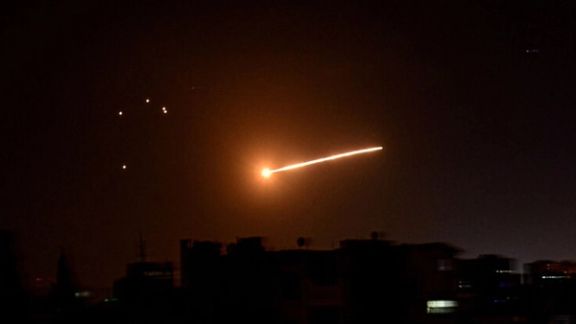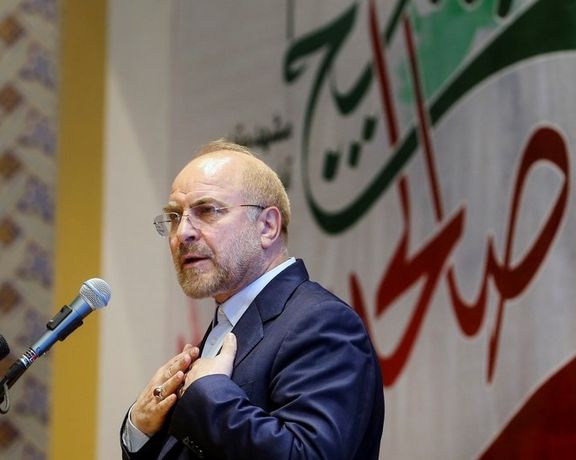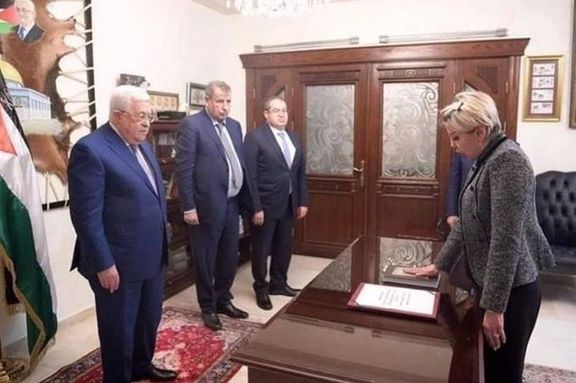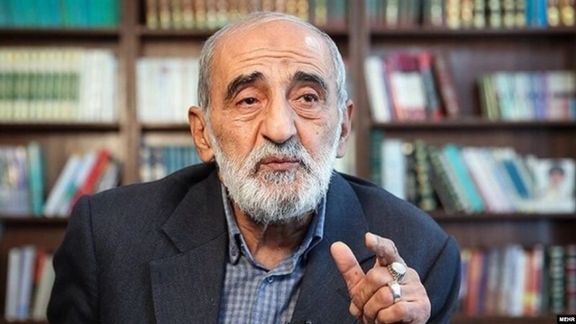Iran Unveils New Ballistic Missile Amid Nuclear Talks

Iran has unveiled a new precision-guided ballistic missile with a range of 1,450 kilometers (900 miles) amid talks with world powers to revive the nuclear deal.

Iran has unveiled a new precision-guided ballistic missile with a range of 1,450 kilometers (900 miles) amid talks with world powers to revive the nuclear deal.
The solid-fuel missile, dubbed Khaybar Shekan, was unveiled on Wednesday in a ceremony attended by Chief of Staff of Armed Forces Major General, Mohammad Bagheri and Commander of the IRGC’s Aerospace Division, Brigadier General Amir-Ali Hajizadeh as well as a number of other military officials and commanders.
According to the Revolutionary Guard (IRGC), the new missile is capable of striking its designated targets with pinpoint accuracy and has a higher agility than Iran’s other missiles.
Officials claimed the new missile, one of Iran’s third-generation long-range missiles manufactured by the IRGC’s Aerospace Division, uses solid propellants, and is said to be capable of penetrating into missile shields with high maneuverability during its landing stage.
The ballistic missile has a pre-determined trajectory and target, with a guidance system that can adjust course just to ensure it impacts as close as possible to the pre-determined target.
Members of the US House of Representatives asked President Joe Biden last week to focus on Iran’s ballistic-missile capabilities, expressing concerns about attempts to develop an intercontinental ballistic missile which could “potentially put US allies in Europe as well as the US homeland in range.”

Iran’s government has announced 48 industrial and infrastructure projects worth $19 billion to help reduce the impact of sanctions and jump-start the economy.
President Ebrahim Raisi and his top economic officials in a brief announcement on Sunday said that large state companies with foreign currency reserves will start the projects regardless of United States’ sanctions and will expand the petrochemical industry, oil and gas, and build power stations.
Critics immediately questioned the claim by demanding more details about “agreements” the government claimed large companies have signed. The official announcement was not more than a few paragraphs long, without providing a clear breakdown of projects and their related targets and costs.
The government claimed that large steel and energy companies have “foreign currency reserves” that they can use to launch the infrastructure projects, without any need for borrowing. The reserves could be referring revenues from exports that steel and petrochemical companies have, but these funds are not really fungible capital. Revenues from exports enter the government’s foreign currency ‘pot’ that are used to finance essential imports.
Iran has been exporting more crude oil in the past one year and it could be assumed that the government has received some foreign currency for the shipments, although details of oil exports and revenues are tightly held as “state secrets.”
Because of years of sanctions and economic inefficiency, Iran has failed to sufficiently invest in its economy, particularly in maintaining production in its vital oil and gas sectors. Oil minister Javad Owji announced in November that $160 billion is needed to revitalize the industry.
The government claimed that once the projects reach completion, they will produce 52 million tons of products and will have an annual turnover of $20 billion dollars, creating 85,000 jobs. However, some media asked to see what exactly these projects are and a timeline for their progress. They asked if agreements the government says were signed between state companies are binding contracts or just memorandums of understanding.
The announcement could have also been made in anticipation of a successful conclusion to nuclear negotiations with the United States that could free up at least $20 billion in Iran’s frozen funds and lift oil export sanctions. The government might have decided to boost morale in the country with the announcement, as more officials and pundits express serious concerns about the political ramifications of the current economic crisis.
Inflation has been hovering above 40 percent for more than a year and food prices rising by 60 percent in 2021 compared with 2020. Politicians warn that the country is facing the danger of a “social explosion.”
The government’s news agency IRNA wrote on Wednesday that the “big achievement” shows Iran can thrive despite sanctions and officials “are not waiting behind the doors of the Coburg Hotel,” a reference to the venue of the nuclear talks in Vienna.
Hardliners in control of Iran’s government have been often making contradictory remarks regarding the impact of US sanctions. At the same that they say Iran has defeated US ‘maximum pressure’ they also call sanctions “cruel” punishment and blame shortcomings on restrictions imposed by the United States. The contradiction can be seen on daily basis in remarks by officials and in government-controlled media.

The Israeli military, in a rare acknowledgement, said it attacked targets in Syria shortly after an anti-aircraft missile was fired into northern Israel early Wednesday.
Syrian state media said a soldier was killed and five others were wounded in the Israeli attack near the capital Damascus
Israel said the Syrian rocket exploded in the air and was not intercepted by Israeli air defenses, but it activated warning sirens in northern Israel.
There were no reports of injuries or damage there.
In a rare statement acknowledging attacks inside Syria, the Israeli army said it struck Syrian facilities used in targeting Israeli aircraft, including a radar and anti-aircraft batteries.
Syrian official news agency SANA reported that Israel fired surface-to-surface missiles in the vicinity of the capital city Damascus and some of them were brought down by air defenses.
Israel has made hundreds of strikes on targets inside government-controlled parts of Syria mostly since 2017, but its government rarely acknowledges or discusses such operations.
Israel also targets Iranian weapons shipments and depots in Syria, primarily to prevent Hezbollah from expanding its arsenal of missiles and other heavy weapons.
Israel has acknowledged, however, that it is targeting bases of Iran-allied militias, such as Hezbollah, which is fighting on the side of Syrian President Bashar Assad’s forces in the country’s civil strife.

Iran’s parliament speaker says the people who regret the 1979 revolution attribute all the failures in the country to the Islamic Republic.
Mohammad Bagher Ghalibaf made the remarks during a joint meeting with officials from the Revolutionary Guards, the Intelligence Ministry, and the country’s police Monday night.
He said there are some people who had been supporters of the Islamic Revolution; “who spoke and wrote for the revolution” but now regret their decisions and say the revolution has had no success and “attribute all of our failures to the revolution.”
He stressed the necessity for more cooperation among the intelligence community in the country, saying that “monitoring is one of the serious needs of the country in the current situation”.
Ghalibaf added that the parliament has allocated a day of its open sessions to monitoring measures and called for more effective use of monitoring tools.
Politicians on both ends of Iran's political spectrum continue to express concernover the dire state of country’s economy and the risk of a social explosion.
Increasing criticism by regime insiders coincides with the anniversary of the Islamic revolution; a time when officials glorify the 1979 revolution and its "achievements”.
This year's celebrations for the revolution are marrednot just by the pandemic but also the fact that it is much harder than ever to speak of the promises of freedom and prosperity given to masses in 1979.

The new Palestinian envoy to Iran has met President Ebrahim Raisi and expressed concern over the growing relations between regional countries and Israel.
Salam Zawai presented her credentials to Raisi on Tuesday, replacing her father Salah Zawawi who was the Palestinian authority’s ambassador to Tehran for over 40 years.
Her appointment by President Mahmoud Abbas drew criticism and accusations of corruption and nepotism from some Palestinians. When Zawawi's father became ambassador, Yasser Arafat was the head of the Palestine Liberation Organization.

During the meeting, she congratulated the Iranian president on the anniversary of Iran’s revolution, describing it as a victory for the Arab and Muslim world, and slammed regional countries for their normalization of ties with Israel.
Iran, as Israel’s archenemy, has sharply criticized the United Arab Emirates and Bahrain for the US-brokered Abraham Accords normalizing relations with Israel in 2020. Common fear of Iran was a factor behind the move.
Zawawi expressed hope for the formation of an independent Palestinian state with Jerusalem as the capital, where she said Supreme Leader Ali Khamenei can lead prayers.
Last week, Israeli Defense Minister Benny Gantz paid a visit to Bahrain amid heightened tensions in the Persian Gulf after missile attacks on the United Arab Emirates by Yemen's Iran-backed Houthi movement.

An editorial in Kayhan claimed views expressed by its hardliner editor Hossein Shariatmadari were shared by Supreme Leader Ali Khamenei and a unified ‘regime.’
Headlined "Let's Not Deceive Ourselves, Kayhan's Stance Is Leader's Stance," the missive on Tuesday responded to criticism from reformist journalist Ahmad Zeydabadi, who in a Telegram post Thursday wrote that Shariatmadari was behaving as if he is “top authority in the country” by lambasting reformist clerics who had issued a statement finding an “unmistakable crisis” in Iran.
The Kayhan editorial charged that if Zeydabadi were right, then “someone else should be appointed to take the helm of Kayhan… [as] stances put forth by the chief editor of Kayhan have nothing to do with the wish, will, and policies of the system.”
While veteran editor Shariatmadari is Khamenei’s representative at the newspaper, Khamenei has many times declined to follow Shariatmadari’s advice, including over backing talks with Europe two decades ago, with the Americans over Afghanistan and Iraq, and in Iran’s agreeing to limit the nuclear program in signing the 2015 JCPOA (Joint Comprehensive Plan of Action).
But Kayhan’s latest editorial asserted that as a "radical revolutionary," the paper’s chief editor was the first to announce stances the “regime” would subsequently adopt.
Kayhan argued that supporters of a nuclear deal claimed that Supreme Leader's support for the negotiation team led by former Foreign Minister Mohammad-Javad Zarif during the talks was proof of irrelevance of Shariatmadari's criticism, but Zarif's ill fate clearly showed that Shariatmadari's critical stance was the same as the Supreme Leader's stance.
"The one who fell to the ground in the confrontation between Kayhan and Zarif was Zarif, and the one who was honored was Hossein Shariatmadari," the editorial continued. It also reminded readers that Khamenei had last year described as a “big error” Zarif’s criticism of the role in foreign policy of Qasem Soleimani, the Iranian general and Quds Force commander killed by a US drone strike in Baghdad in 2020.
The newspaper was referring to Khamenei's harsh words against Zarif in May 2021 after a leaked audio recording of an interview with him made headlines. In the interview Zarif had strongly criticized the Revolutionary Guards (IRGC) and the former commander of its Qods force, Ghasem Soleimani for hijacking Iran's foreign policy. Without mentioning Zarif's name, Khamenei called the remarks "a big error," that was "regrettable and surprising."
"This was a big mistake that should not have been committed by an Islamic Republic official. The enemies are annoyed by the Qods Force's influence in the region," and one part of the political system should not undermine the other part, Khamenei said.
The editorial went on to suggest it had been Shariatmadari's criticism that had led recently to Ali Shamkhani, secretary of the Supreme National Security Council, retracting a suggestion of the possibility of direct bilateral talks with Washington over the nuclear issue.